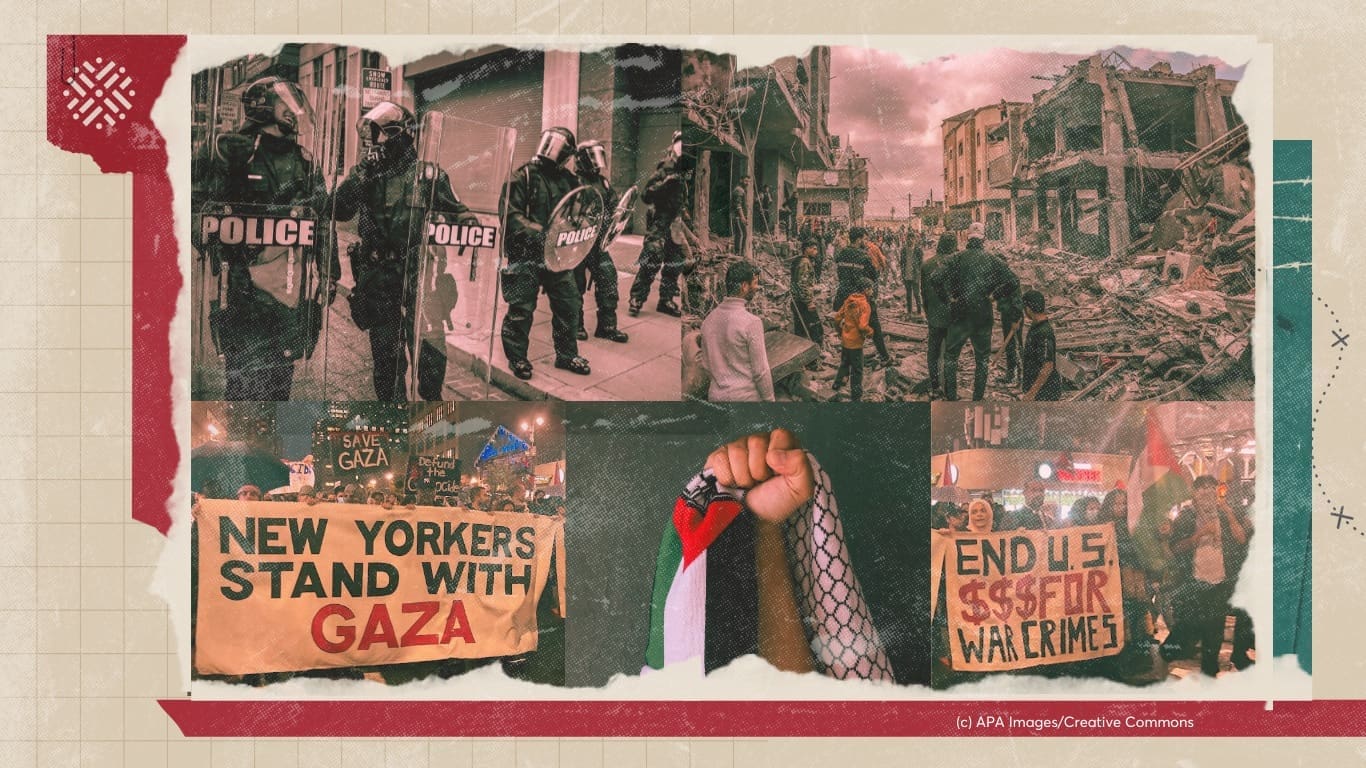
Executive Summary
Project Esther, launched by the Heritage Foundation in October 2024, represents the most brazen effort yet to suppress Palestinian advocacy in the US under the guise of combating antisemitism.
It is part of a broader authoritarian shift in US politics—intensified under Donald Trump’s second term—using censorship, lawfare, and intimidation to target the Palestine solidarity movement.
Project Esther falsely reframes pro-Palestine organizations as part of a “Hamas Support Network,” weaponizing legal and financial tools to criminalize advocacy.
Project Esther constitutes a direct assault on democratic principles, serving as both a test case and a blueprint for broader crackdowns on dissent, civil liberties, and progressive movements.
In response to this assault, pro-Palestine groups should do the following:
- Build movement resilience and intersectional solidarity to counter fragmentation and isolation.
- Reframe anti-Zionist advocacy as a human rights and public interest issue grounded in justice and accountability.
- Strengthen legal defenses by leveraging anti-SLAPP laws and preparing for criminalization under terrorism and foreign agent statutes.
- Diversify and secure funding streams to resist defunding campaigns and sustain organizing efforts.
- Document and expose repression to mobilize public support and affirm Palestine advocacy as essential to democratic struggle.
Introduction
On October 7, 2024, marking one year since Hamas’s Al-Aqsa Flood operation, the conservative DC-based Heritage Foundation introduced Project Esther as their latest and most brazen effort yet to crush Palestinian solidarity. Framed as an initiative to combat antisemitism, Project Esther exclusively targets voices and groups critical of the Israeli regime. It calls for collaboration between public and private entities to employ censorship, intimidation, and lawfare to delegitimize and dismantle organizations advocating for Palestinian rights. However, Project Esther—and the broader pro-Israel efforts to counter growing Palestine solidarity—did not begin with the genocide in Gaza.1
For decades, Zionists and their allies have systematically sought to suppress public dissent against the US’s unwavering support for the Israeli regime by targeting individuals and groups advocating for Palestinian rights. While efforts to silence pro-Palestine activism are not new, they have escalated significantly under President Donald Trump. Shortly after taking office for his second term, Trump signed an executive order expanding crackdowns on pro-Palestine advocacy under the guise of combating antisemitism. His administration has intensified bipartisan repression by revoking student visas, arresting and deporting activists, and increasing federal oversight of universities to monitor and control campus organizing, among other measures.
In this context, Project Esther is more than just a desperate attempt to salvage a crumbling Zionist narrative—it is part of a broader authoritarian shift in US politics. Across the country, attacks on dissent, free speech, and marginalized communities are redefining the relationship between the state and civil society. Palestinian solidarity has become an epicenter in a broader effort to erode democratic values, exposing the fragility of rights many Americans have long taken for granted.
This policy brief situates Project Esther within the broader bipartisan crackdown on Palestine advocacy—a consequence of the Zionist movement’s failure to win the argument in the public sphere. It argues that this repression is not just an attack on Palestinians and the solidarity movement but a litmus test for US democracy. It also provides a roadmap for resisting this authoritarian turn, ensuring that the fight for Palestinian liberation remains central to the broader struggle for justice and equality.
Evolving Trends in Pro-Palestine Support
Pro-Israel narratives that have dominated US mainstream discourse for decades have gradually unraveled in recent years, causing shifts in public opinion and deepening the anxieties of Israel’s supporters. While mainstream media outlets continue to mythologize Israel as a “beleaguered democracy” defending itself against “terrorism,” these narratives are increasingly contested. Independent news and social media platforms have offered Palestinians fresh outlets to tell their own stories and challenge longstanding propaganda. In academia, students, scholars, and activists advocating for Palestinian liberation are increasingly challenging the once-dominant pro-Israel narrative. This shift is evident in the nationwide student-led movement against the genocide in Gaza, which the US political establishment continues to suppress.
Project Esther is more than just a desperate attempt to salvage a crumbling Zionist narrative—it is part of a broader authoritarian shift in US politics Share on X
Similarly, Boycott, Divestment, and Sanctions (BDS) victories, ranging from artists and musicians refusing to perform inside 1948 lands to companies like Ben & Jerry’s attempting to halt sales in the occupied West Bank, signal a cultural shift that makes it harder for Israel’s defenders to justify unconditional support for a regime widely seen as genocidal. This transformation in public consciousness is precisely what supporters of the Israeli regime fear most, as it erodes the unconditional support essential to sustaining Israel’s violent settler-colonial project. Given how deeply rooted pro-Israel sentiment is in the US, the current shifts in public opinion on Palestine are striking.
While polls do not tell the whole story, they offer key insights into shifting trends with real implications for advocacy and policymaking. On average, Americans still sympathize more with Israelis than Palestinians. However, support for the Israeli regime is cratering. According to Gallup’s 2025 survey, sympathy for Israel has fallen below 50% for the first time in polling history, dropping to just 46%. Polling by the same organization found that sympathy for Palestinians rose from 25% in 2021 to 33% in 2025.
Deepening party polarization and generational divides have fueled these trends. Gallup found that 59% of Democrats sympathized more with Palestinians, while only 21% sided with Israelis. The same does not apply to Republican sympathies, which remain overwhelmingly pro-Israel, with 75% favoring Israelis compared to just 10% supporting Palestinians. However, a growing number of prominent conservative commentators have become increasingly critical of Israel and now oppose unconditional US support.
Meanwhile, growing support for Palestinians and rising criticism of Israel among younger Americans have created a stark generational chasm with significant implications for future US policy. A February 2024 Pew Research Center survey found that 33% of Americans aged 18-29 from across the political spectrum sympathized more with Palestinians, while only 14% sided with Israelis. This finding glaringly contrasts with the 47% of respondents aged 65 and older who sympathized more with Israelis. This generational realignment is what Israel’s staunchest political allies in the US find most troubling, as reflected in their nationwide crackdown on campus activism.
Of course, while sympathies do not always translate into policy priorities or voting decisions, the assault on Gaza has intensified these trends, driving more Americans to oppose Washington’s longstanding support for Israel. A recent CBS News poll found that approximately 61% of Americans across the political spectrum oppose additional US military aid to Israel. This means that a growing number of Americans are not only reassessing their wider sympathies but are also increasingly questioning their government’s use of taxpayer dollars to support and enable Israeli war crimes.
Despite growing sympathy for Palestinians and waning support for unconditional aid to Israel, these shifts have yet to influence US policy. In fact, since October 2023, Washington’s support for the Israeli regime has reached new heights, actively enabling the ongoing genocide. Yet, despite increased US support, Israel’s advocates remain concerned about shifting public opinion. They worry that growing sympathy for Palestinians and declining support for unconditional aid to Israel could, if left unchallenged, eventually trigger meaningful policy changes that fundamentally call into question the “special” US-Israel relationship. In response, Israel’s supporters are resorting to increasingly authoritarian tactics to silence dissent and suppress advocacy for Palestinian rights.
A Crackdown Long in the Making
The increasingly authoritarian measures we see today are rooted in a bipartisan legacy that spans decades. For example, anti-Palestinian policymakers have long shaped US antiterrorism laws and counterterrorism policy. The first federal statute to reference “terrorism” appeared in the 1969 US Foreign Assistance Act, which required UNRWA to ensure that no US aid reached “any refugee receiving military training from a member of the so-called Palestinian Liberation Army or engaged in any act of terrorism.” Of course, the law offered no clear definition of terrorism. Still, it effectively cast Palestinians—particularly refugees—as presumed perpetrators, embedding a bias that continues to shape US policy and public discourse to this day. With each new iteration of these “antiterrorism” laws, one constant remained: the deliberate ambiguity that allowed the federal government to define “terrorism” to suit its objectives.
The association between Palestinians and terrorism became an entrenched legal bias, shaping a broad array of US laws and policies designed to suppress Palestinian advocacy Share on X
The association between Palestinians and terrorism became an entrenched legal bias, shaping a broad array of US laws and policies designed to suppress Palestinian advocacy. This includes leveraging “material support” laws—which prohibit providing financial, logistical, or other aid to foreign terrorist organizations (FTO)—to target humanitarian groups while also expanding surveillance programs that label Palestinian Americans as extremists or security threats. Successive US administrations have weaponized legislation—rooted in the Antiterrorism and Effective Death Penalty Act of 1996, the PATRIOT Act of 2001, and key legal precedents—to criminalize humanitarian aid and advocacy for Palestinians. In the post-9/11 era, federal authorities increasingly deployed counterterrorism legislation to curtail civil liberties. They used it to surveil and shut down organizations accused—often without evidence—of ties to terrorism. These measures have created an environment where advocating for Palestinian liberation is not only controversial but also increasingly portrayed as criminal or subversive.
Israel-aligned groups have also expanded their arsenal of legal tools aimed at suppressing pro-Palestine advocacy. For example, the International Holocaust Remembrance Alliance (IHRA) definition of antisemitism, adopted by numerous institutions and government bodies, conflates anti-Zionism with antisemitism, effectively silencing criticism of Israel. The IHRA definition also fails to acknowledge antisemitism’s deep historical roots in Western white supremacy. As a result, this redefinition of antisemitism does little to protect Jewish people. Instead, it enables the suppression of legitimate advocacy for Palestinian liberation, chilling free expression.
Another facet of this crackdown on pro-Palestine advocacy is the surge of anti-boycott legislation sweeping across the US. Since 2014, dozens of US states have enacted laws penalizing individuals and companies that boycott or refuse to engage with entities complicit in the Israeli occupation—part of a broader BDS movement—often barring them from doing business with the state. For example, in 2022, the Eighth Circuit Court of Appeals upheld an Arkansas law requiring state contractors to pledge not to boycott Israel. The decision erodes constitutional protections by restricting boycotts, which the US Supreme Court recognizes as free political expression safeguarded under the First Amendment. Although federal courts in several states have struck down such anti-boycott measures as unconstitutional, the broader effort to suppress BDS initiatives against Israel persists, and the Trump Administration aims to take it to a new level.
Project Esther: Combating Dissent, Not Antisemitism
Since returning to office in January 2025, Trump and his pro-Israel allies have intensified efforts to suppress support for Palestinian rights, adopting increasingly authoritarian measures to stifle activism and advocacy. Unlike their Democratic counterparts, who often justify such measures as necessary to combat antisemitism, far-right Republican leaders unapologetically wield authoritarian tactics—not only to silence advocates for Palestinian rights but to advance a broader agenda of eroding civil liberties and targeting dissent. Project Esther exemplifies this strategy, honing in on an issue where liberal commitments to civil rights and free speech repeatedly falter: Palestinian rights advocacy.
On October 7, 2024, the Heritage Foundation presented Project Esther as a “national strategy to combat antisemitism.” In practice, however, the project conflates anti-Zionism and criticism of Israel with antisemitism, leveraging state power and private resources to dismantle the pro-Palestine solidarity movement in the US through a systematic campaign of intimidation, defunding, and criminalization.
Far-right Republican leaders unapologetically wield authoritarian tactics—not only to silence advocates for Palestinian rights but to advance a broader agenda of eroding civil liberties and targeting dissent Share on X
A central pillar of Project Esther is its effort to reframe the entire Palestine solidarity movement as the “Hamas Support Network,” designating its constituent organizations as “Hamas Support Organizations.” By doing so, it effectively casts any group advocating for Palestinian rights as aligned with Hamas. This deceptive framing allows Project Esther to deploy a two-pronged strategy, combining soft and hard power tactics: one to discredit the movement in the public eye and the other to criminalize its operations through legal and financial warfare.
- Soft Power Tactics: By falsely claiming that pro-Palestine organizations are linked to or take direction from Hamas—a group designated by the US government as an FTO—Project Esther aims to discredit, isolate, and fracture the movement in the eyes of Americans.
- Hard Power Tactics: Designating these organizations as supporters of terrorism threatens their ability to fundraise, operate legally, and engage in advocacy, effectively neutralizing their capacity to organize.
By employing these tactics, Project Esther’s architects intend to leverage financial, legal, and reputational warfare to discredit the Palestine solidarity movement and devastate its operations.
- Financial Depletion: By targeting the financial pipelines that sustain groups like Students for Justice in Palestine, American Muslims for Palestine, and Jewish Voice for Peace, Project Esther aims to render organizations advocating for Palestinian rights financially unsustainable, forcing them to shut down or drastically scale back their activities. This strategy includes pressuring donor foundations and academic institutions to withdraw funding and support under threat of reputational damage or legal liability.
- Lawfare: Project Esther seeks to weaponize the legal system to criminalize Palestinian advocacy. The initiative advocates using counterterrorism and anti-racketeering laws to target groups and individuals engaged in organizing or fundraising for Palestinian causes, alleging affiliations with or support for groups like Hamas. To further this agenda, Project Esther deploys strategic lawsuits designed to drain the resources of pro-Palestine groups under the pretense of national security. These efforts also include deporting non-citizen activists. Ultimately, these measures aim to reframe pro-Palestine advocacy as not just illegitimate but illegal.
- Reputational Damage: Project Esther aims to sow distrust and division within the broader movement for Palestinian rights. Echoing the tactics of the McCarthy era, Project Esther’s strategy calls for “research and investigation” aimed at uncovering alleged “criminal wrongdoing” within targeted organizations, implying plans to monitor and potentially infiltrate these groups to gather intelligence. This would be followed by public campaigns accusing individuals and organizations of ties to antisemitism or anti-American sentiment. This tactic makes it difficult for other groups to associate with the targeted organizations without risking reputational damage or legal consequences. Organizations like Canary Mission, which doxxes pro-Palestine students, workers, and academics, play a central role in this “name-and-shame” campaign.
Together, these hard and soft power tactics aim to erode the progress the pro-Palestine movement has made in shifting US public opinion. Lawfare aims to delegitimize constitutionally protected advocacy while disinformation campaigns portray the Palestinian solidarity movement as driven by foreign influence, obscuring its grassroots origins. Importantly, while Project Esther targets organizations and individuals defending Palestinian rights, its broader impact would involve reshaping US society by purging diverse perspectives from education, stifling student protests, and eliminating critical discourse on Zionism in public and academic spaces. Ultimately, the project’s goal is to make advocating for Palestinian rights not just controversial but illegal. If it succeeds, its architects will have a template to expand their targets.
It is crucial to view Project Esther not just as an attack on the Palestinian solidarity movement but as part of the Trump administration’s broader assault on democracy. The Heritage Foundation and other influential ultra-conservative power brokers are using initiatives like Project Esther to expand and refine powerful legal mechanisms, which have long disproportionately targeted marginalized communities and left-wing activists. These include:
- Foreign Agents Registration Act (FARA): Project Esther advocates for the utilization of FARA in order to investigate pro-Palestine organizations and activists as representatives of foreign interests, setting a dangerous precedent for its broader use against any movement critical of US policy.
- Racketeer Influenced and Corrupt Organizations Act (RICO): By labeling Palestine solidarity groups as part of a so-called “Hamas Support Network,” Project Esther lays the groundwork for RICO prosecutions— a strategy that could just as easily be weaponized against labor unions, climate activists, and other movements the far-right seeks to dismantle.
- Counterterrorism Frameworks: The false and unfounded connection drawn between advocacy in support of Palestinian rights and direct association with an FTO serves to justify expanded surveillance, legal action, and extrajudicial repression—further entrenching policies historically used to criminalize Muslim, Black, and Indigenous activism.
- Immigration Laws: By advocating for the deportation of foreign-born activists, Project Esther is establishing a precedent for even broader immigration crackdowns against dissenters, including refugees, asylum seekers, and other vulnerable communities.
Beyond these instruments of repression, Project Esther relies on fear-driven messaging and disinformation campaigns to influence policy.
Using Fear as a Cudgel
Project Esther is an initiative rooted in disinformation, fear, and conservative fundamentalism. The founders of Project Esther named it after the biblical figure Esther, celebrated in Jewish tradition for saving her people from genocide in ancient Persia. By appropriating Esther’s story, the initiative aims to draw a moral parallel between historical Jewish survival and modern Zionist agendas, portraying critics of Israel as existential threats to Jewish safety and using this rhetoric to justify increasingly authoritarian demands.
In reality, concerns for Jewish safety do not drive Project Esther; instead, a far-right Christian nationalist agenda shapes its objectives. The Heritage Foundation reportedly struggled to secure Jewish organizations as official “partners.” Several organizations that the Heritage Foundation insisted played a direct role in the initiative’s creation have denied the claim, including the World Jewish Congress and the Republican Jewish Coalition. This does not mean these organizations shy away from quashing criticism of Israel. They may have been reluctant to join a partisan crusade led by Evangelical Christians—or they wanted to claim ownership of the “war on antisemitism” themselves. Regardless of their motives, the deeper issue is whether Project Esther’s true goal is combating antisemitism at all.
Project Esther conflates anti-Zionism and criticism of Israel with antisemitism, leveraging state power and private resources to dismantle the pro-Palestine solidarity movement in the US. Share on X
If combating antisemitism had been the primary objective of Project Esther, its architects would have presented a plan to address the source of its most violent manifestations: the far-right. However, Project Esther explicitly downplays the dangers of far-right antisemitism and makes no mention of addressing white supremacy. Instead, it paints antisemitism as a form of discrimination that only emanates from the pro-Palestine political left. With that in mind, it lists nearly every Democrat who has ever voiced even the slightest criticism of Israel, branding them as part of a so-called “Hamas Caucus.” Meanwhile, Republicans such as Rand Paul and Thomas Massie, both outspoken critics of continued unconditional military aid to Israel, are notably omitted.
Project Esther’s report, which outlines its strategy to combat antisemitism, fails to mention a single Republican, despite clear instances of antisemitism within the GOP in recent years. It did not condemn Trump’s routine invocation of antisemitic rhetoric, including dual loyalty tropes suggesting Jewish Americans who vote for Democrats are disloyal to Israel and their faith. It also fails to mention Marjorie Taylor Greene, who voted against the Antisemitism Awareness Act of 2023 (H.R. 6090), claiming it contradicted the “gospel.” These omissions expose Project Esther for what it truly is: a blueprint for suppressing dissent against unconditional support for Israel, silencing advocates for Palestinian rights, and entrenching extreme conservative agendas. It has nothing to do with combating antisemitism.
By weaponizing Jewish trauma to advance its agenda, Project Esther undermines genuine efforts to combat antisemitism, aligning itself with the white supremacist forces that have historically posed the greatest threat to Jewish communities. In fact, using the pretext of Jewish safety to dismantle hard-won democratic protections, such as freedom of speech, only reinforces the very stereotypes that fuel antisemitism.
A Direct Assault on Democracy
Project Esther emerges as an extension of Project 2025, a comprehensive far-right agenda that Trump initially distanced himself from during his reelection campaign, only to implement it in a blitzkrieg series of executive orders upon returning to office. Project Esther represents the natural culmination of the broader crackdown on Palestinian solidarity. It also comes at a time when some of the most repressive, supremacist forces in the US are poised to tighten their grip on the halls of power.
Like the broader crackdown on Palestinian solidarity, Project Esther is ultimately an attempt to reclaim narratives that have long justified unconditional US support for Israel. It reflects a broader conservative backlash in the US, as many on the right believe that the stories and myths sustaining their privileges are eroding in an increasingly diverse and politically conscious society. In one sense, Project Esther presents itself as a forward-looking initiative, but at its core, it is a reactionary attempt to preserve the status quo.
The architects of Project Esther are desperately fighting against growing support for Palestinians and increasing criticism of the Israeli regime, both of which are outcomes of the democratic process itself. As pillars of democracy, the open exchange of information and free speech have enabled Palestinians to share their stories, ultimately fostering skepticism toward the continued unconditional US support for the Israeli regime. By working to silence groups and individuals who defend Palestinian rights or criticize Israeli policy, Israel’s supporters are actively undermining the democratic process.
In the face of the repressive machinery unleashed by initiatives like Project Esther and the broader assault on Palestinian solidarity, the need for strategic, unified, and proactive action has never been greater. Below are recommendations for individuals and organizations committed to defending Palestinian advocacy and upholding the broader principles of justice, equality, and free expression. These strategic recommendations aim to fortify Palestinian advocacy, ensuring resilience, unity, and effectiveness in the face of escalating repression.
Recommendations
Building Movement Resilience and Intersectional Solidarity
The greatest threat to pro-Palestine advocacy is isolation. Project Esther’s strategy aims to divide the Palestine solidarity movement and sever it from other human rights causes. To counter this attack, the pro-Palestine movement must strengthen alliances and build a broad, unified coalition.
- Foster intra-movement solidarity: Establish shared platforms for communication and mutual support within the pro-Palestine movement to counter division and mistrust.
- Highlight intersectionality: Forge alliances with environmental, Indigenous, and racial justice movements, among others, to broaden support and strengthen coalition-building.
- Underscore the threat to constitutional freedoms: Frame Project Esther as a direct attack on First Amendment rights for all Americans, not just Palestinian advocates, to galvanize broader opposition to repressive attacks on dissent and civil liberties.
Winning the Information War
Public opinion is a key battleground. Effective messaging and strategic reframing can challenge disinformation promoted by Zionist-aligned groups.
- Reframe anti-Zionism as a human rights and public interest issue: Position opposition to Israeli policies within universal principles of justice, equality, and responsible use of US tax dollars.
- Expose right-wing cooptation of antisemitism discourse: Demonstrate how conflating criticism of Israel with antisemitism undermines genuine efforts to combat hate and protect Jewish communities.
- Document and expose repression: Track and publicize the human and democratic costs of Project Esther and similar initiatives to build a compelling case for solidarity.
Strengthening Legal Defenses and Bolstering Funding
Strong legal strategies and diversified funding sources are essential to counter the lawfare tactics used by Project Esther to silence dissent.
- Leverage anti-SLAPP laws: Utilize Strategic Lawsuit Against Public Participation (anti-SLAPP) laws—designed to prevent lawsuits aimed at chilling free speech—to protect activists and organizations.
- Expand and diversify grassroots funding: Build a network of small donors and international supporters to ensure financial independence and mitigate the impact of defunding campaigns.
- To read this piece in French, please click here. Al-Shabaka is grateful for the efforts by human rights advocates to translate its pieces, but is not responsible for any change in meaning.













